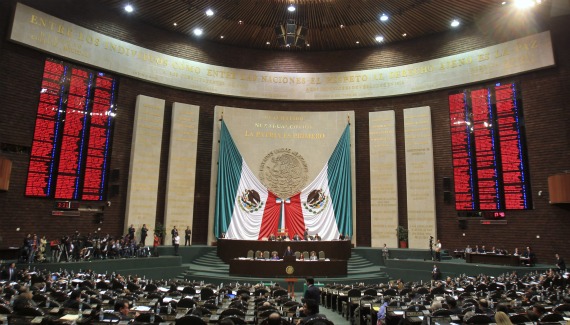Mexico’s Unfinished Congressional Business
More on:

Mexicans briefly got their hopes —and some their hackles— up this week as Congress debated potentially transformative reforms. The first dealt with national security, designed to strengthen the existing 2005 law and formalize the army’s de facto role in keeping the peace. The reform failed due to concerns over the protection of human rights and civil liberties in the face of broadly (and vaguely) defined internal threats and expanded intelligence gathering tools.
Political reform too made the rounds, also passing the Senate but shut down by the Chamber of Deputies. Fewer criticized this law, which would have allowed independent citizens to run for office and introduced national referendums. Most significantly, it would have allowed reelection in Mexico.
Taking term limits to the extreme, Mexico currently doesn’t permit reelection, period. From the president on down—governors, senators, deputies, local mayors and town councilors—no Mexican politician can stay. Initially written to limit local political fiefdoms, this electoral design created non-territorial fiefdoms instead, concentrating power in the hands of party leaders. The rule offers aspiring politicians little incentive to follow through on campaign promises or appease local voters, as their next career step depends more on the party hierarchy. Citizens can’t directly “punish” bad leaders or reward good ones as they will move on at the end of their first and only term.
These term limits also hamper institutional memory and learning. For instance, Mexican mayors have three-year terms. The first year they are settling in, appointing their staff, learning the ropes. The second year (if citizens are lucky) they work hard to address local issues. But by the third year, they must turn to their personal future—which can’t be as mayor. Locals can’t reward them for good service or undivided attention, and so—many times—they get neither. This hits issues that require longer time horizons—economic growth, security, good governance—the hardest.
For years, Mexico’s academic community has been pushing for electoral reforms. They argue that reelection would bolster accountability and, in the long-term, increase trust and participation in the political system. (To be sure, reelection won’t solve all of Mexico’s ills - it won’t end corruption or improve Mexico’s courts, among other issues.) But despite widespread agreement on the real benefits, it still didn’t happen, for two reasons.
First, while the reform would lessen the control of party bosses over politicians, until it passes these same leaders hold the careers of aspiring politicians in their hands. Too few are willing to stick their necks out, fearing that if the law doesn’t pass, their political careers certainly will. In 2005— the last time political reform came up for a vote and despite the PRI’s party-wide protestations of wholehearted support for change—the party bailed on the day, claiming that they wanted “a better bill.” Senator Genaro Borrego, who had introduced the bill, was the lone yay vote from the PRI, and he was already planning on retiring. Second, this particular bill also opened up the presidential race to independent candidates. This couldn’t have pleased the current PRI presidential front-runner, who holds sway in Mexico’s lower chamber.
With Congress’s regular session ending tomorrow, political reform, labor reform, and tax reform all wait not only until the next September session, but realistically until after the 2012 presidential elections. (An extraordinary session will likely be scheduled for May/June to pass the security reform).
But, this congressional session wasn’t a total wash. What did pass both the House and Senate unanimously is a law beefing up penalties for Mexico’s monopolies. Under the new rules, firms found guilty of monopolistic practices could be fined up to 10% of their earnings and their executives sent to jail. The law also gives the Federal Competition Commission (CFC) more teeth. It comes on the heels of a record $1 billion regulatory fine for Telcel (Mexico’s leading telecom company) – as well as public suggestions of further fines in the works. While most will judge this session as an example of legislative gridlock, 2011 could shape up to be the year Mexico confronted its monopolies.
More on:
 Online Store
Online Store
